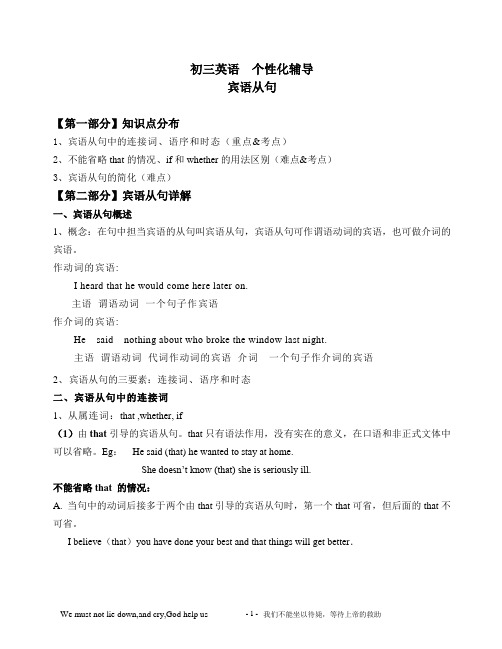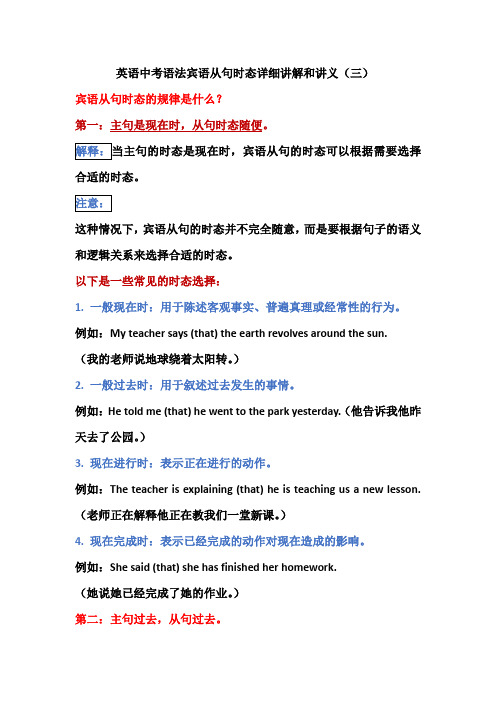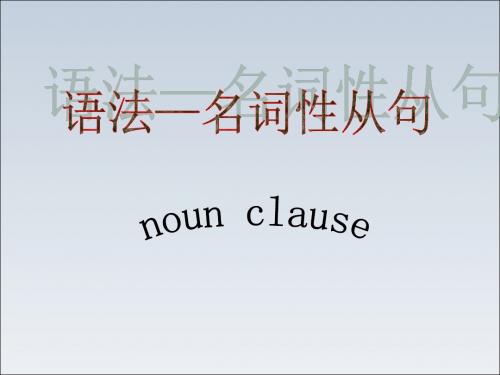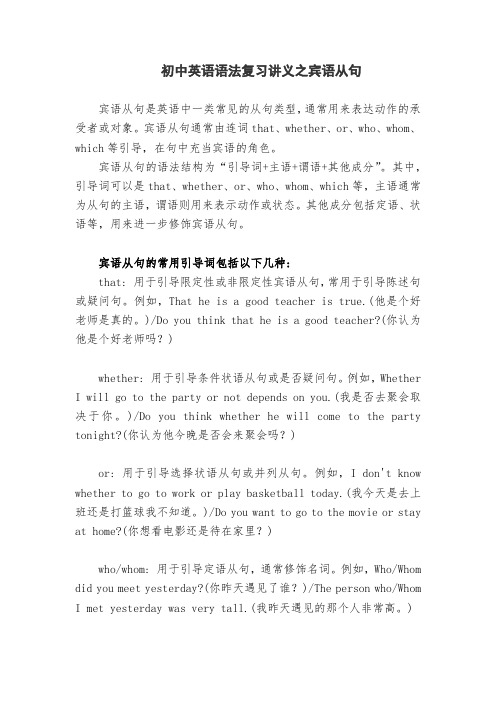宾语从句讲义
中考英语宾语从句讲义完善版

初三英语个性化辅导宾语从句【第一部分】知识点分布1、宾语从句中的连接词、语序和时态(重点&考点)2、不能省略that的情况、if和whether的用法区别(难点&考点)3、宾语从句的简化(难点)【第二部分】宾语从句详解一、宾语从句概述1、概念:在句中担当宾语的从句叫宾语从句,宾语从句可作谓语动词的宾语,也可做介词的宾语。
作动词的宾语:I heard that he would come here later on.主语谓语动词一个句子作宾语作介词的宾语:He said nothing about who broke the window last night.主语谓语动词代词作动词的宾语介词一个句子作介词的宾语2、宾语从句的三要素:连接词、语序和时态二、宾语从句中的连接词1、从属连词:that ,whether, if(1)由that引导的宾语从句。
that只有语法作用,没有实在的意义,在口语和非正式文体中可以省略。
Eg:He said (that) he wanted to stay at home.She doesn’t know (that) she is seriously ill.不能省略that 的情况:A. 当句中的动词后接多于两个由that引导的宾语从句时,第一个that可省,但后面的that不可省。
I believe(that)you have done your best and that things will get better.B. 当主句的谓语动词与that宾语从句之间有插入语时,that一般不可省。
Just then I noticed, for the first time, that our master was wearing his fine green coat and his black silk cap.C. 当that从句是双宾语中的直接宾语时,that不可省。
宾语从句讲义

宾语从句一. 宾语从句的种类? 宾语从句是一种名词性从句,在句中作及物动词的宾语,或介词的宾语,或形容词的宾语。
? Everyone knows that the earth is made up of matter. 众所周知,地球是由物质组成。
(动词后跟的宾语从句,是一种非常普遍的现象)? Is there anything wrong in what you said? 你是不是说错了?(介词后跟的宾语从句,介词后根据意思表达的需要完全可以跟句子作宾语,要注意的是个别介词如:besides, but, except, in 等,后面跟that 引导的从句作宾语已经形成习惯用语了:besides that, (除······以外),but that (若不是······),except that (除了······),in that (在于,因为))? I am not certain whether (if) the train will arrive on time. 我确定火车会不会准时到站。
(形容词后面跟的宾语从句。
这种现象只局限于少数动态形容词,如:sure (确信),certain(肯定),afraid(恐怕),confident(确信)等。
)? 根据引导宾语从句的不同连词,宾语从句可分为三类。
1. 由that引导的宾语从句。
That只有语法作用,没有实在的意义,在口语和非正式文体中可以省略。
例如:He said (that) he wanted to stay at home. She doesn’t know (that) she is seriously ill. I am sure (that) he will succeed.2. 由连接代词who, whom, whose, what, which和连接副词when, where, why, how引导的宾语从句。
英语中考宾语从句详细讲解和讲义(三)

英语中考语法宾语从句时态详细讲解和讲义(三)宾语从句时态的规律是什么?第一:主句是现在时,从句时态随便。
解释:当主句的时态是现在时,宾语从句的时态可以根据需要选择合适的时态。
注意:这种情况下,宾语从句的时态并不完全随意,而是要根据句子的语义和逻辑关系来选择合适的时态。
以下是一些常见的时态选择:1.一般现在时:用于陈述客观事实、普遍真理或经常性的行为。
例如:My teacher says (that) the earth revolves around the sun.(我的老师说地球绕着太阳转。
)2.一般过去时:用于叙述过去发生的事情。
例如:He told me (that) he went to the park yesterday.(他告诉我他昨天去了公园。
)3.现在进行时:表示正在进行的动作。
例如:The teacher is explaining (that) he is teaching us a new lesson.(老师正在解释他正在教我们一堂新课。
)4.现在完成时:表示已经完成的动作对现在造成的影响。
例如:She said (that) she has finished her homework.(她说她已经完成了她的作业。
)第二:主句过去,从句过去。
解释:这种情况下,宾语从句的时态与主句的时态保持一致,以表达一个相对于主句发生的过去事件或状态。
以下是一些例子来解释宾语从句中时态的规律:1.一般过去时:用于陈述过去发生的事实或经常性的行为。
例如:She said (that) she went to the cinema last night.(她说她昨晚去了电影院。
)2.过去进行时:表示在过去某个时间点正在进行的动作。
例如:He told me (that) he was studying when I called him.(他告诉我当我给他打电话时他正在学习。
)3.过去完成时:表示在过去某个时间点之前已经完成的动作。
宾语从句(经典)讲义.

宾语从句中引导词的用法
在复合句中作主句的宾语,引导词有:
连词:that (that 常可省略),whether, if 代词:who, whose, what ,which 副词:when ,where, how, why 等。
1. I
主语
know him . (简单句)
谓语 宾语
2. I
主语 主
英语句子概论
英语句子的种类
简单句 (simple sentence) 并列句 (compound sentence)
复合句 (complex sentence)
简单句的五种基本句型
The weather is very cold. 主语+谓语(连系动词)+表语 He laughed. 主语+谓语(vi.) I like Chinese food. 主语+谓语(vt.)+宾语 She taught them physics. 主语+谓语(vt.)+间接宾语+直接宾语 We must keep the room warm. 主语+谓语(vt.) +宾语+宾语补足语
常用并列连词:
并
并列句
and, both…and, not only… but also, • 平行并列连词: neither…nor • 转折并列连词:but, however, while, yet, • 因果并列连词: for, so
• 选择并列连词: or,either…or
复合句:主句+从句 名词性从句 定语从句 状语从句
His job is important.
.
表语
{
This is his job.
中考英语复习宾语从句语法专题讲义

宾语从句一、定义宾语,或的宾语。
【译】你能告诉我你们在讨论什么吗?【译】我确定他会成功。
二、分类一)由that引导的宾语从句(that没有实在的意义,可以省略。
)Eg. Lily told me (that) she never plays computer game.【译】她说她想待在家。
Eg. Can you tell me where the No.3 bus stop is?【译】我们不知道火车为什么晚点了。
【译】你们知道李明放学后在等谁吗?三)由if或whether引导的宾语从句。
【译】他问我是否能帮他一个忙。
【译】莉莉想知道她小学同学玛丽是否还住在成都。
三、语序【译】你能告诉我我们什么时候开始开会吗?【译】汤姆想知道如何去图书馆。
四、时态一)如果主句的时态是一般过去时,宾语从句只能用Eg.He asked what time it was.【译】他说他很快就会回到他的故乡了。
二)如果主句是与现在相关的时态(一般现在时、现在进行时、现在完成时等),Eg.I think (that) you are right.【译】我记得他昨天给了我一本书。
【译】老师告诉我们太阳从东方升起。
【译】科学家证明了地球是圆的。
五、直接引语和间接引语的相互转化。
1.The doctor says, “You had better stay at home for a week.”2.Teacher says, “You have to study hard.”3.Emma says, “I feel cold.”4.Tom says that he wants to be a basketball player in the future.5.They say that it’s not very hot in their city in summer.总结:课后练习一、单项选择题A. thatB. whichC. whyD. what2.Our teacher told us that we_______ the shoe factory the next week.A. visitedB. will visit C would visit D. visitA. mightB. mayC. has toD. canA.tells; would writeB. told; had writtenC. told; will writeD. tells; had written5.He asked __________ Betty came home late last night.A.thatB.whetherC.where6.Mr. White asked me whether I the book before.A. has readB. readC. had readD. would read7.Mr. Green says ____________they will go back to England.A whereB whichC whoD that8. A:What did Tony tell you?B: He told me he .A. leavesB. has leftC. was leavingD. will leave9.---Do you know____________?---At 9:00 tomorrow morning?A.when the video meeting beginB.when did the video meeting beginC.when the video meeting will beginD. when does the video meeting begin10.---Could you please tell me____________?---Throwing off poverty(脱贫)A.who people often talk about this yearB.what people often talk about this yearC.which do people often talk about this yearD.that people often talk about this year二、将下列直接引语变为间接引语,每空一词。
宾语从句讲义

宾语从句讲义一、定义:在复合句中充当宾语的从句叫宾语从句,宾语从句可作谓语动词的宾语,也可做介词的宾语。
例:He said he was good at drawing. (动词宾语)Miss Zhang is angry at what you said. (介词宾语)二、宾语从句三要素:引导词、语序、时态1、引导词(1)陈述句转化成宾语从句时,引导词用that,口语中常常省略。
例:We should learn from each other. We all know.→We all know(that)we should learn from each other.(2)以 whether 或 if 引导的宾语从句,主要用来引导一般疑问句意思或选择疑问句意思的宾语从句,引导词后要用陈述句语序。
例:Do you have been to America? Please tell me.→Please tell me if/whether you have been to America.注意:一般情况下,whether 和if 可以互用,但有些情况例外。
a.当从句做介词的宾语时只用whether 。
例: We are talking about whether we'll go on the picnic.b. 引导词与动词不定式或or not 连用时,只用whether。
例: Please let me know what to do next.Could you tell me whether you go or not?c. if当“如果”讲时,引导的是条件状语从句,这时不能用whether。
(3)特殊疑问句转化成宾语从句时,引导词用特殊疑问词;引导词后要用陈述句语序。
例:How can I get to the station? Could you tell me ?→Could you tell me how I can get to the station?2、语序在含有宾语从句的复合句中,不管充当宾语从句的句子原来是什么语序,构成宾语从句时,一定要用陈述语序。
宾语从句(讲义及答案).

宾语从句一、定义及种类定义:宾语从句在复合句中作主句的宾语宾语从句可以作及物动词、介词或形容词的宾语。
及物动词宾语:I don’t know what he likes.介词宾语:We are talking about whether it’s a cat or a dog.形容词宾语:I am sorry I am late. I am glad that you can join us.种类:根据不同的引导词分为三类:that引导:He said that he wanted to stay at home.whether/if引导:He asked me whether/if(是否) he could go.特殊疑问词引导:Can you tell me where the No.3 bus stop is?二、宾语从句——引导词、语序、时态1. 引导词①由_______________引导I don’t know (that) she is seriously ill.I am sure (that) he will succeed.that后加陈述语序,由陈述句变化而来。
这里的that只有语法作用,没有实在的意义,在口语和非正式文体中常省略。
②由_______________引导(其意思是__________)I want to know whether/if she likes Zhengzhou.He asked me whether/if I could help him.whether/if后加陈述语序,由一般疑问句转化而来。
③由_______________引导I don’t know why he loves crying.He asked who was the best.Do you know who (whom) they are waiting for?特殊疑问词后加陈述语序,由特殊疑问句转化而来。
初中英语语法复习讲义之宾语从句

初中英语语法复习讲义之宾语从句宾语从句是英语中一类常见的从句类型,通常用来表达动作的承受者或对象。
宾语从句通常由连词that、whether、or、who、whom、which等引导,在句中充当宾语的角色。
宾语从句的语法结构为“引导词+主语+谓语+其他成分”。
其中,引导词可以是that、whether、or、who、whom、which等,主语通常为从句的主语,谓语则用来表示动作或状态。
其他成分包括定语、状语等,用来进一步修饰宾语从句。
宾语从句的常用引导词包括以下几种:that: 用于引导限定性或非限定性宾语从句,常用于引导陈述句或疑问句。
例如,That he is a good teacher is true.(他是个好老师是真的。
)/Do you think that he is a good teacher?(你认为他是个好老师吗?)whether: 用于引导条件状语从句或是否疑问句。
例如,Whether I will go to the party or not depends on you.(我是否去聚会取决于你。
)/Do you think whether he will come to the party tonight?(你认为他今晚是否会来聚会吗?)or: 用于引导选择状语从句或并列从句。
例如,I don't know whether to go to work or play basketball today.(我今天是去上班还是打篮球我不知道。
)/Do you want to go to the movie or stay at home?(你想看电影还是待在家里?)who/whom: 用于引导定语从句,通常修饰名词。
例如,Who/Whom did you meet yesterday?(你昨天遇见了谁?)/The person who/Whom I met yesterday was very tall.(我昨天遇见的那个人非常高。
- 1、下载文档前请自行甄别文档内容的完整性,平台不提供额外的编辑、内容补充、找答案等附加服务。
- 2、"仅部分预览"的文档,不可在线预览部分如存在完整性等问题,可反馈申请退款(可完整预览的文档不适用该条件!)。
- 3、如文档侵犯您的权益,请联系客服反馈,我们会尽快为您处理(人工客服工作时间:9:00-18:30)。
宾语从句讲义什么是宾语从句一、宾语从句定义宾语从句是一种名词性从句,在句中作及物动词的宾语,或介词的宾语,或形容词的宾语。
作动词的宾语:I heard that he would come here later on.主语谓语动词一个句子作宾语作介词的宾语:He said nothing about who broke the window last night.主语谓语动词代词作动词的宾语介词一个句子作介词的宾语根据引导宾语从句的不同连词,宾语从句可分为三类。
二、宾语从句的种类宾语从句的种类1. 由that引导的宾语从句。
that只有语法作用,没有实在的意义,在口语和非正式文体中可以省略。
可跟that从句做宾语的动词有:say, think, insist, wish, hope, demand, imagine, wonder, know, suppose, see, believe, agree,admit, deny, expect, explain, order, command, feel, dream, suggest, hear, mean, notice, prefer,request, require, propose, declare, report等。
例如:He said (that) he wanted to stay at home.She doesn’t know (that) she is seriously ill.I am sure (that) he will succeed.The boy believes that he will travel through space to other planets.2. 由连接代词who, whom, whose, what, which和连接副词when, where, why, how引导的宾语从句。
这样的宾语从句实际上是由特殊疑问句变化而来的,宾语从句要用陈述句语序。
用于这种结构的动词常常是:see, say, tell, ask, answer, know, decide, show, find out, imagine,suggest, doubt, wonder, discover, understand, inform, advise等。
这些连接代词和连接副词在宾语从句中充当某个成分。
例如:(1)连接代词:who,whom,whose,which,what,在句中担任主语、宾语、定语或者表语。
连接代词一般指疑问,但what, whatever除了指疑问外,也可以指陈述.Do you know who has won Red Alert game?你知道是谁赢得了红色警报的游戏么?The book will show you what the best CEOs should know.这本书会告诉你最好的执行总裁该了解什么.Have you determined whichever you should buy,a Motorola or Nokia cell phone?你决定好是买诺基亚还是摩托罗拉的电话了吗?Do you know who (whom) they are waiting foe?He asked whose handwriting was the best.(2)连接副词有:when,where,why,how,在句中担任状语的成分。
He didn’t tell me when we should meet again. 他没有告诉我什么时候我们能再见面.Could you please tell me how you use the new panel?你能告诉我怎么用这个新的操作盘吗?None of us knows where these new parts can be bought.没有人知道这些的新的零件能在哪里买到.Can you tell me where the No.3 bus stop is?I don’t know why the train is late.3. 由if或whether引导的宾语从句。
if和whether在句中的意思是“是否”。
例如:I want to know if (whether) he lives there.He asked me whether (if) I could help him.宾语从句使用要点一、宾语从句的语序必须是陈述语序。
1.Do you know why winter is colder than summer? 你知道为什么冬季比夏季冷吗?2.When did he leave? I want to know. →I want to know when he left.3.Does the shop close at six every day? Do you know? →Do you know if/ whether the shopcloses at six every day?二、宾语从句与主句的时态要相互呼应。
1. 如果主句是一般现在时、一般将来时或祈使句时,宾语从句可根据情况使用各种时态。
例如:I hear she is here today。
I hear she was here yesterday。
I hear she will be here tomorrow.2. 如果主句是一般过去时,宾语从句应使用过去时态的某种形式。
例如:He said he was watching TV.He said he had swept the floor.He said he would play football after school.He said he had finished his studies when the war broke out.他说战争爆发时,他已经完成了学业。
He said he would spend his holiday in Dalian.他说他将在大连度假。
3. 如宾语从句所叙述的是客观事实、自然现象或科学真理等,从句不受主句时态限制,仍用一般现在时。
例如:Our teacher told us that light travels faster than sound.She said that the earth moves around the sun.她说地球围绕太阳转。
主句宾语从句一般现在时或一般将来时根据实际情况选用任何时态一般过去时过去的某种时态三、引导词的使用 1. 当宾语从句由陈述句变化而来时,用that来引导从句,that常无具体意义,一般可省略。
例如:Lin Tao thought(that)the TV play was very boring.He said (that) he wanted to stay at home.2. 当宾语从句是由一般疑问句变化而来时,要用if或whether来引导从句。
if和whether在句中的意思是“是否”。
例如:David asked his mother if/ whether she liked the dinner last night.3. 当宾语从句是由特殊疑问句变化而来时,原句中的疑问词充当连接代词(如who,whose, what, which)或连接副词(如when, where, why, how),引导宾语从句。
例如:Do you know what we can do on the island?I don’t know why Jane was late for school this morning.I don’t know why the train is late.注意:如果宾语从句是用and连接的并列句,两个宾语从句前都要使用连接词;如果连接词都是that,第一个可以省略,第二个则不能。
例如:I heard(that)their team won and that the teacher was please.四、否定转移 1. 主句的谓语动词是think, believe, imagine, suppose, consider, expect, fancy, guess等, 并且主句的主语是第一人称而且为一般现在时, 从句的否定词一般要转移到主句上来,其反义疑问句一般与宾语从句一致. 例如:I don’t think it is right for him to treat you like that.I don’t believe he is here on time, is he?I don’t think Tom is the best student in his class, is he?I don’t believe that man is killed by Jim,is he?我认为那个人不是Jim所杀的,是不是?I expect our English teacher will be back this weekend, won't she/he?We suppose you have finished the project, haven't you?如果宾语从句中有某个含有否定意义的形容词或副词(不包含带有否定前缀的词,如:unhappy,unfair,dislike等), 其反义疑问句要用肯定形式.We find that he never listens to the teacher carefully, does he?我们发现他从不仔细听老师讲课,是不是?2. 当主句的主语是第二、三人称时,其反义疑问句一般与主句保持一致。
Your sister supposes she needs no help, doesn't she?You thought they could have completed the project, didn't you?They don't believe she's an engineer, do they?She doesn't expect that we are coming so soon, does she?五、如宾语从句有自己的宾语补足语,则用it作形式宾语,而把宾语从句后置。
其句型为:“主语+谓语+it+补足语+宾语从句”。
如:We think it important that we should master at least one foreign language. 我们认为掌握至少一门外语是重要的。
